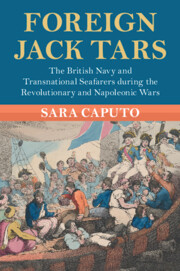 Foreign Jack Tars
Foreign Jack Tars Book contents
- Foreign Jack Tars
- Modern British Histories
- Foreign Jack Tars
- Copyright page
- Dedication
- Contents
- Figures
- Tables
- Acknowledgements
- Introduction
- Part I The State
- Part II The Nation
- 3 A Babel and a Gehenna
- 4 ‘Complexions of Every Varied Hue’
- 5 ‘They Cannot Keep the Sea beyond a Passage’
- 6 ‘From among the Northern Nations Alone’
- Part III Displacement
- Conclusion
- Book part
- Bibliography
- Index
4 - ‘Complexions of Every Varied Hue’
Racial Beliefs, Biopower, and Acclimatisation
from Part II - The Nation
Published online by Cambridge University Press: 03 November 2022
- Foreign Jack Tars
- Modern British Histories
- Foreign Jack Tars
- Copyright page
- Dedication
- Contents
- Figures
- Tables
- Acknowledgements
- Introduction
- Part I The State
- Part II The Nation
- 3 A Babel and a Gehenna
- 4 ‘Complexions of Every Varied Hue’
- 5 ‘They Cannot Keep the Sea beyond a Passage’
- 6 ‘From among the Northern Nations Alone’
- Part III Displacement
- Conclusion
- Book part
- Bibliography
- Index
Summary
Chapter 4 discusses various cultural constructions of physical difference: racialised phenotype, supposed medical predisposition or resistance to specific diseases and climes, and concepts of filthiness and hygiene. The eighteenth-century Navy was embedded into the structural racism of the Atlantic world and British empire, and many seamen suffered from this. Yet, unlike other institutions, it still rarely used ‘race’ as a systematic label to recruit, classify, or sift its workforce. Seamen were occasionally deployed according to climatic theories of national character and racialised constructions of disease and immunity. However, many naval surgeons still saw immunity as acquired rather than innate, and thus modifiable and dependent on a man’s most recent deployment, rather than intrinsic to ‘race’. Similarly, prejudice surrounding the cleanliness and attitudes of some groups of ‘foreigners’ was linked more to the administrative structures of foreign countries and navies than to essentialist understandings of the individuals themselves. Therefore, in the eyes of many officers, virtually any able man could be absorbed, reformed, and put to use by British naval discipline. This did not mitigate the violence and discrimination of everyday racism, but it highlights the somewhat levelling attitude of an administration bent on maximising its efficient exploitation of manpower.
Keywords
- Type
- Chapter
- Information
- Foreign Jack TarsThe British Navy and Transnational Seafarers during the Revolutionary and Napoleonic Wars, pp. 117 - 142Publisher: Cambridge University PressPrint publication year: 2022
